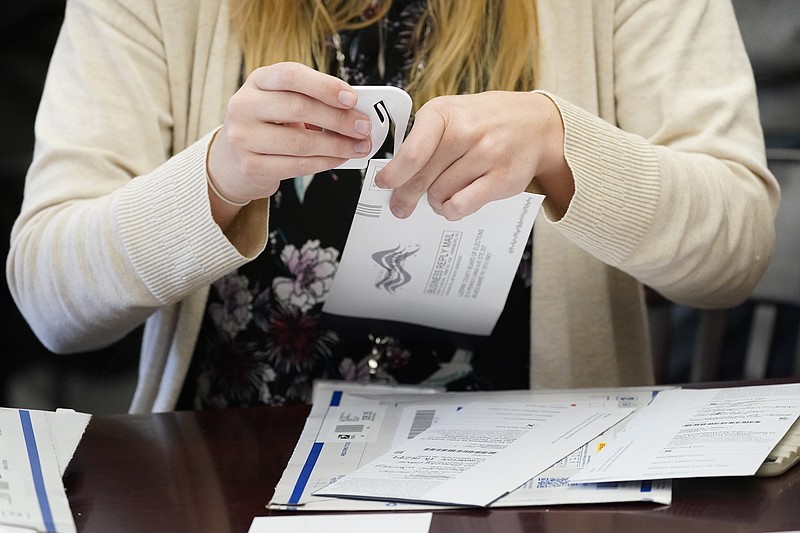When millions of people believe an election has been stolen, the issue of who won the 2020 presidential race is not going to go away quickly.
For the record, we don't believe it was stolen, although we do believe there was some fraud, but nowhere near enough to overturn the results of the election.
Election reform could fix some of that fraud and perhaps give some of those millions at least the hope going forward that things have changed.
When some states can count 99% of their ballots on Election Day and others haven't counted them all three weeks later, there's a problem. Somehow or another, we're not all on the same page.
Will a President Joe Biden and a likely divided Congress be willing to tackle that issue? We don't believe it's nearly as tough as health care reform and would cost far less.
It might be something a Biden administration could point to as an accomplishment, especially if a Republican Senate stalemates the far-left legislation Democrats were sure they would enact with a solid Democratic House, a Democratic Senate and a Democratic presidency.
But would Democrats, accused as the fraudsters by President Donald Trump, be willing to be a part of such reform?
In the spring, when we first resurrected the recommendations of the 2005 Commission on Federal Election Reform, nobody was talking about them. But, as discussion first began to surface about mail-in ballots for the presidential election amid the new coronavirus, one sentence from the report stood out: "Absentee ballots remain the largest source of potential voter fraud."
In France, mail-in ballots have been banned in most circumstances since the 1970s. And in the Netherlands they are available only to those outside the country on election day.
But as various states began okaying mail-in ballots this year, others concerned with ballot safety found the 2005 report, which had been headed by former Democratic President Jimmy Carter and former Republican Secretary of State James Baker.
The report was commissioned in light of the 2000 presidential election when a 537-vote margin in Florida - after the U.S. Supreme Court stopped what seemed like the millionth vote count - handed the election to then-Texas Gov. George W. Bush.
"So many of the problems we're now hearing about in the aftermath of the 2020 election could have been avoided had states heeded the advice of the Commission on Federal Election Reform," Kay W. James, a member of the 2005 commission and now the president of The Heritage Foundation, told The Daily Signal. "Simple protections against fraud, like voter ID and updated voter registration lists, make perfect sense if we truly believe that every vote must count. Election officials should take another look at the commission's recommendations to protect the integrity of our elections."
Most Democrats across the country have opposed voter ID laws, but the commission suggested they be standard nationwide. Although 36 states require or request identification at the polls, according to the National Conference of State Legislators, only six have "strict" photo ID requirements. Tennessee and Georgia are two of those.
"Americans have to remember," Carter told a Georgia newspaper in May 2006, "you have to have the equivalent to what we're requiring to cast a ballot to cash a check or board a plane."
The commission also recommended against what has come to be known as ballot harvesting, where third parties or political operatives pick up ballots from voters and deliver them to voting centers. California, which has had to correct its election practices in recent years after lawsuits were filed, and Nevada, where the Trump campaign has filed suit, are two of the states where ballot harvesting is allowed (and more than family members are allowed to collect ballots).
Two other areas where the commission suggested reforms became trouble spots in the 2020 race, at least according to the Trump campaign.
His campaign suggested thousands of out-of-state voters may have cast ballots in Nevada, and it said in Pennsylvania, Michigan and Nevada election observers were prohibited from watching the counting. To date, none of the campaign's challenges on those issues have been upheld.
The commission had recommended "voter databases should be made interoperable between states" to eliminate duplicate registrations, and noted that "invalid voter files, which contain ineligible, duplicate, fictional, or deceased voters, are an invitation to fraud."
It further suggested, "All legitimate domestic and international election observers should be granted unrestricted access to the election process, provided that they accept election rules, do not interfere with the electoral process, and respect the secrecy of the ballot."
Among other things, it said all voting machines should print out paper receipts to assure accuracy, that news outlets should refrain from calling elections in the various states until the polls are closed in all the states, and that federal and state prosecutors should more closely monitor voter fraud.
Those changes won't eliminate all fraud, but shouldn't voters and office-holders from both parties feel they can trust the election wasn't stolen? We think so.
